Legal Case Study: Heritage Pty Ltd - Contract and Director's Authority
VerifiedAdded on 2022/05/19
|11
|3244
|16
Case Study
AI Summary
This case study analyzes the legal issues arising from the actions of Heritage Pty Ltd's directors, focusing on contract law and the authority of company directors. The case involves a contract for armored vans and the withdrawal of assets from a storage facility. The solution examines whether Heritage is bound by the contract signed by Mary, a director who exceeded her internal authority, considering the principles of actual and apparent authority, and the application of sections 125, 128, and 129 of the Corporations Act 2001. The analysis also addresses whether No Worries Storage Ltd can be held liable for releasing assets based on a forged document, considering the indoor management rule and the assumptions that can be made by third parties. The case explores the remedies available to the company and its shareholders against the defaulting officers and the validity of contracts entered into by the company's agents. The solution considers the implications of directors' actions and the protection of third parties who interact with the company. It also provides analysis on the remedies for Peter against the company and Roger.
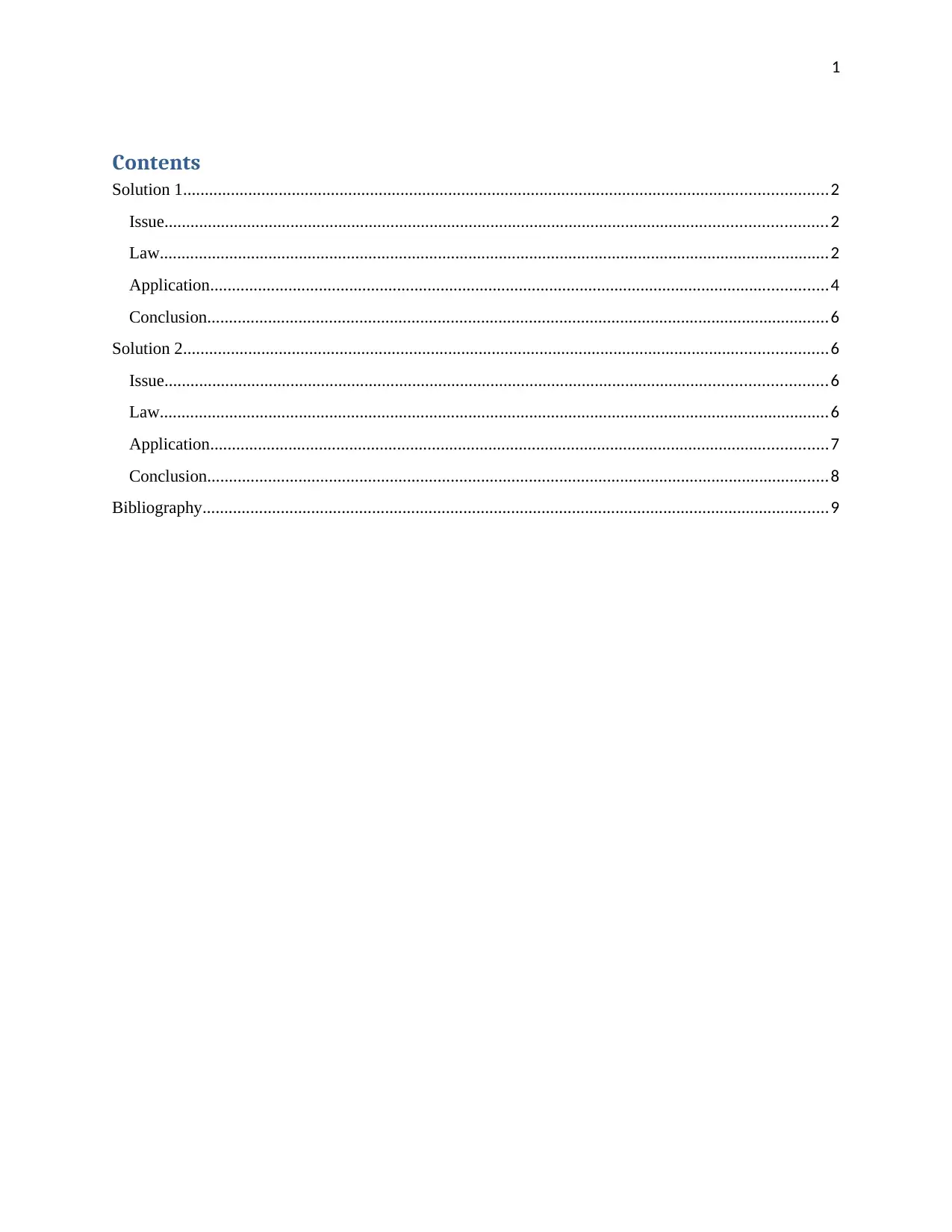
1
Contents
Solution 1....................................................................................................................................................2
Issue........................................................................................................................................................2
Law..........................................................................................................................................................2
Application..............................................................................................................................................4
Conclusion...............................................................................................................................................6
Solution 2....................................................................................................................................................6
Issue........................................................................................................................................................6
Law..........................................................................................................................................................6
Application..............................................................................................................................................7
Conclusion...............................................................................................................................................8
Bibliography................................................................................................................................................9
Contents
Solution 1....................................................................................................................................................2
Issue........................................................................................................................................................2
Law..........................................................................................................................................................2
Application..............................................................................................................................................4
Conclusion...............................................................................................................................................6
Solution 2....................................................................................................................................................6
Issue........................................................................................................................................................6
Law..........................................................................................................................................................6
Application..............................................................................................................................................7
Conclusion...............................................................................................................................................8
Bibliography................................................................................................................................................9
Paraphrase This Document
Need a fresh take? Get an instant paraphrase of this document with our AI Paraphraser
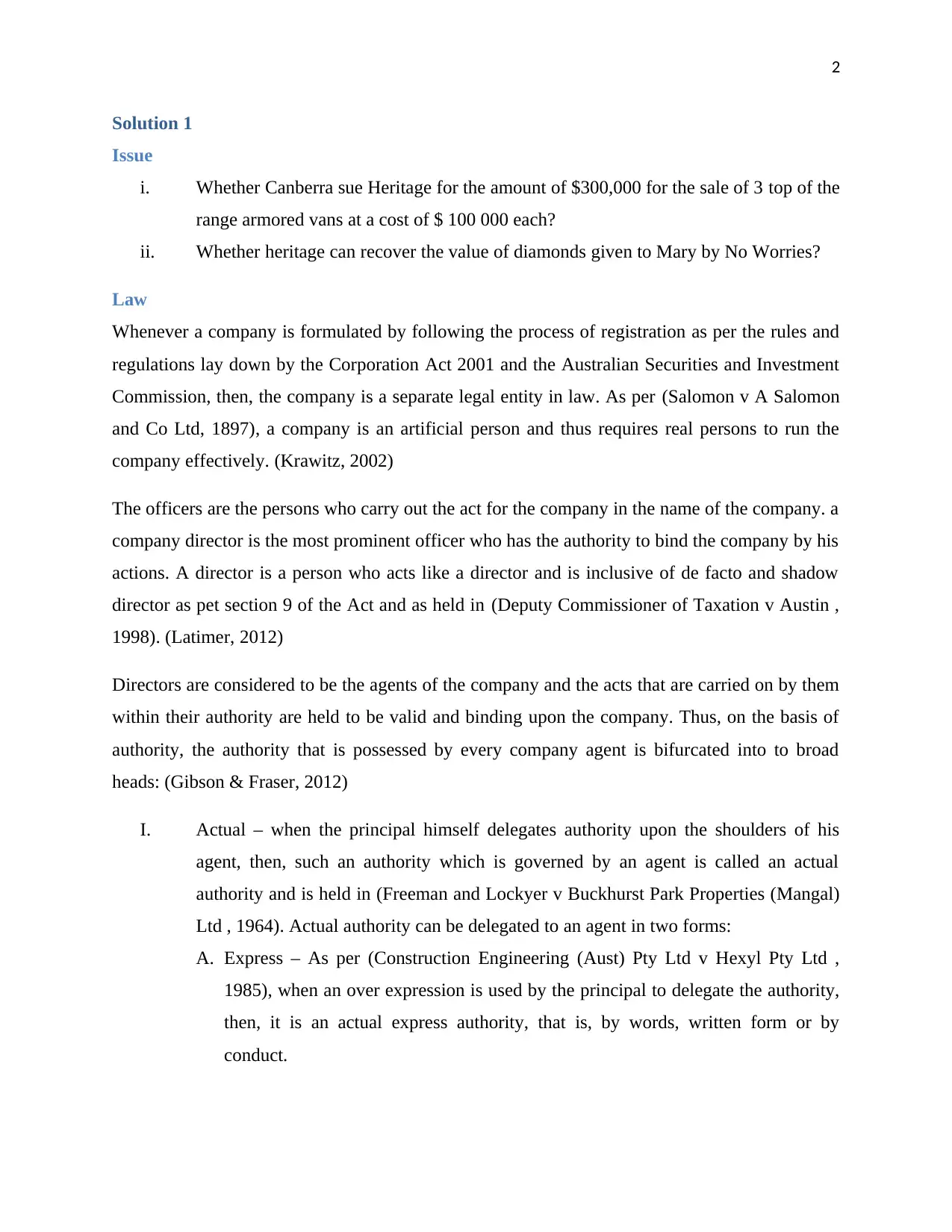
2
Solution 1
Issue
i. Whether Canberra sue Heritage for the amount of $300,000 for the sale of 3 top of the
range armored vans at a cost of $ 100 000 each?
ii. Whether heritage can recover the value of diamonds given to Mary by No Worries?
Law
Whenever a company is formulated by following the process of registration as per the rules and
regulations lay down by the Corporation Act 2001 and the Australian Securities and Investment
Commission, then, the company is a separate legal entity in law. As per (Salomon v A Salomon
and Co Ltd, 1897), a company is an artificial person and thus requires real persons to run the
company effectively. (Krawitz, 2002)
The officers are the persons who carry out the act for the company in the name of the company. a
company director is the most prominent officer who has the authority to bind the company by his
actions. A director is a person who acts like a director and is inclusive of de facto and shadow
director as pet section 9 of the Act and as held in (Deputy Commissioner of Taxation v Austin ,
1998). (Latimer, 2012)
Directors are considered to be the agents of the company and the acts that are carried on by them
within their authority are held to be valid and binding upon the company. Thus, on the basis of
authority, the authority that is possessed by every company agent is bifurcated into to broad
heads: (Gibson & Fraser, 2012)
I. Actual – when the principal himself delegates authority upon the shoulders of his
agent, then, such an authority which is governed by an agent is called an actual
authority and is held in (Freeman and Lockyer v Buckhurst Park Properties (Mangal)
Ltd , 1964). Actual authority can be delegated to an agent in two forms:
A. Express – As per (Construction Engineering (Aust) Pty Ltd v Hexyl Pty Ltd ,
1985), when an over expression is used by the principal to delegate the authority,
then, it is an actual express authority, that is, by words, written form or by
conduct.
Solution 1
Issue
i. Whether Canberra sue Heritage for the amount of $300,000 for the sale of 3 top of the
range armored vans at a cost of $ 100 000 each?
ii. Whether heritage can recover the value of diamonds given to Mary by No Worries?
Law
Whenever a company is formulated by following the process of registration as per the rules and
regulations lay down by the Corporation Act 2001 and the Australian Securities and Investment
Commission, then, the company is a separate legal entity in law. As per (Salomon v A Salomon
and Co Ltd, 1897), a company is an artificial person and thus requires real persons to run the
company effectively. (Krawitz, 2002)
The officers are the persons who carry out the act for the company in the name of the company. a
company director is the most prominent officer who has the authority to bind the company by his
actions. A director is a person who acts like a director and is inclusive of de facto and shadow
director as pet section 9 of the Act and as held in (Deputy Commissioner of Taxation v Austin ,
1998). (Latimer, 2012)
Directors are considered to be the agents of the company and the acts that are carried on by them
within their authority are held to be valid and binding upon the company. Thus, on the basis of
authority, the authority that is possessed by every company agent is bifurcated into to broad
heads: (Gibson & Fraser, 2012)
I. Actual – when the principal himself delegates authority upon the shoulders of his
agent, then, such an authority which is governed by an agent is called an actual
authority and is held in (Freeman and Lockyer v Buckhurst Park Properties (Mangal)
Ltd , 1964). Actual authority can be delegated to an agent in two forms:
A. Express – As per (Construction Engineering (Aust) Pty Ltd v Hexyl Pty Ltd ,
1985), when an over expression is used by the principal to delegate the authority,
then, it is an actual express authority, that is, by words, written form or by
conduct.
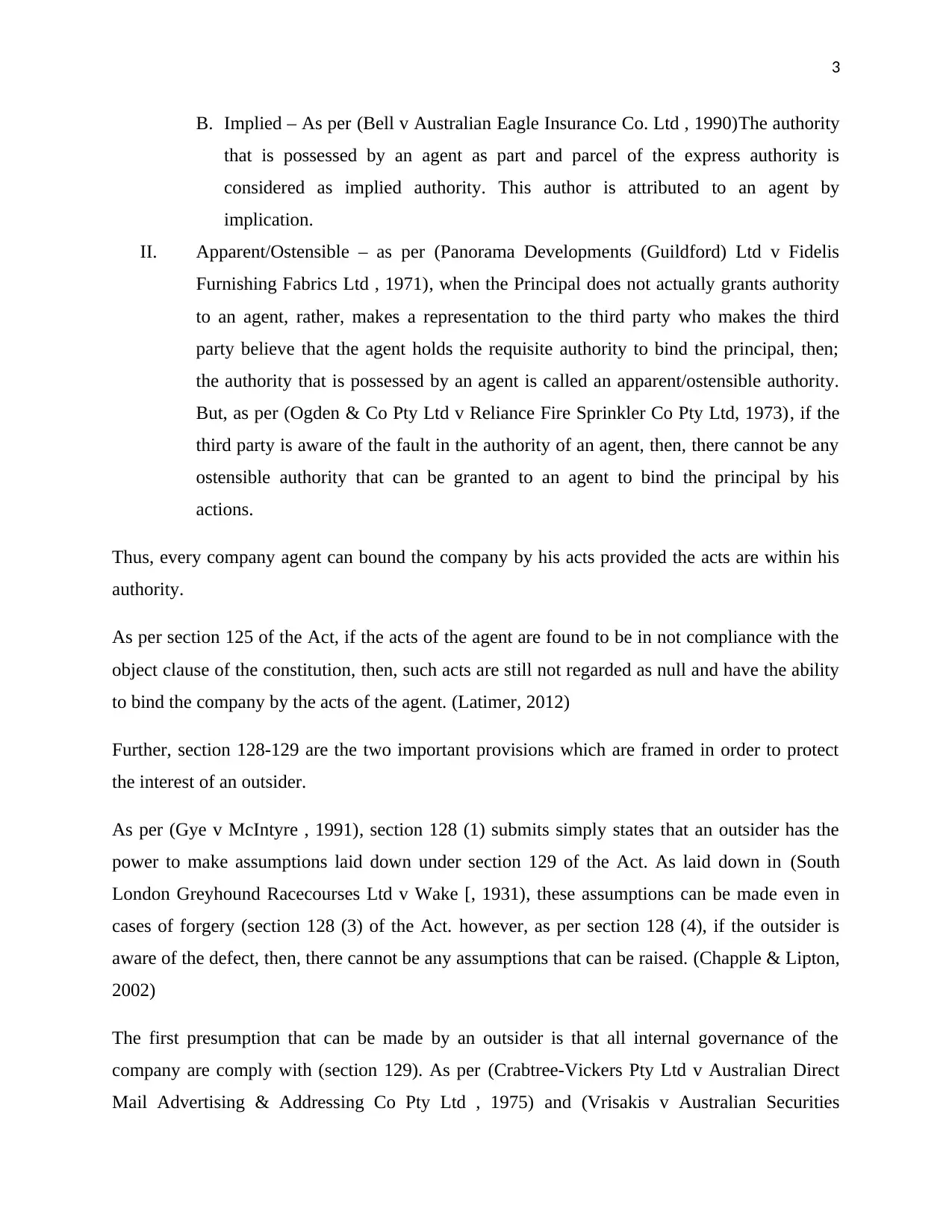
3
B. Implied – As per (Bell v Australian Eagle Insurance Co. Ltd , 1990)The authority
that is possessed by an agent as part and parcel of the express authority is
considered as implied authority. This author is attributed to an agent by
implication.
II. Apparent/Ostensible – as per (Panorama Developments (Guildford) Ltd v Fidelis
Furnishing Fabrics Ltd , 1971), when the Principal does not actually grants authority
to an agent, rather, makes a representation to the third party who makes the third
party believe that the agent holds the requisite authority to bind the principal, then;
the authority that is possessed by an agent is called an apparent/ostensible authority.
But, as per (Ogden & Co Pty Ltd v Reliance Fire Sprinkler Co Pty Ltd, 1973), if the
third party is aware of the fault in the authority of an agent, then, there cannot be any
ostensible authority that can be granted to an agent to bind the principal by his
actions.
Thus, every company agent can bound the company by his acts provided the acts are within his
authority.
As per section 125 of the Act, if the acts of the agent are found to be in not compliance with the
object clause of the constitution, then, such acts are still not regarded as null and have the ability
to bind the company by the acts of the agent. (Latimer, 2012)
Further, section 128-129 are the two important provisions which are framed in order to protect
the interest of an outsider.
As per (Gye v McIntyre , 1991), section 128 (1) submits simply states that an outsider has the
power to make assumptions laid down under section 129 of the Act. As laid down in (South
London Greyhound Racecourses Ltd v Wake [, 1931), these assumptions can be made even in
cases of forgery (section 128 (3) of the Act. however, as per section 128 (4), if the outsider is
aware of the defect, then, there cannot be any assumptions that can be raised. (Chapple & Lipton,
2002)
The first presumption that can be made by an outsider is that all internal governance of the
company are comply with (section 129). As per (Crabtree-Vickers Pty Ltd v Australian Direct
Mail Advertising & Addressing Co Pty Ltd , 1975) and (Vrisakis v Australian Securities
B. Implied – As per (Bell v Australian Eagle Insurance Co. Ltd , 1990)The authority
that is possessed by an agent as part and parcel of the express authority is
considered as implied authority. This author is attributed to an agent by
implication.
II. Apparent/Ostensible – as per (Panorama Developments (Guildford) Ltd v Fidelis
Furnishing Fabrics Ltd , 1971), when the Principal does not actually grants authority
to an agent, rather, makes a representation to the third party who makes the third
party believe that the agent holds the requisite authority to bind the principal, then;
the authority that is possessed by an agent is called an apparent/ostensible authority.
But, as per (Ogden & Co Pty Ltd v Reliance Fire Sprinkler Co Pty Ltd, 1973), if the
third party is aware of the fault in the authority of an agent, then, there cannot be any
ostensible authority that can be granted to an agent to bind the principal by his
actions.
Thus, every company agent can bound the company by his acts provided the acts are within his
authority.
As per section 125 of the Act, if the acts of the agent are found to be in not compliance with the
object clause of the constitution, then, such acts are still not regarded as null and have the ability
to bind the company by the acts of the agent. (Latimer, 2012)
Further, section 128-129 are the two important provisions which are framed in order to protect
the interest of an outsider.
As per (Gye v McIntyre , 1991), section 128 (1) submits simply states that an outsider has the
power to make assumptions laid down under section 129 of the Act. As laid down in (South
London Greyhound Racecourses Ltd v Wake [, 1931), these assumptions can be made even in
cases of forgery (section 128 (3) of the Act. however, as per section 128 (4), if the outsider is
aware of the defect, then, there cannot be any assumptions that can be raised. (Chapple & Lipton,
2002)
The first presumption that can be made by an outsider is that all internal governance of the
company are comply with (section 129). As per (Crabtree-Vickers Pty Ltd v Australian Direct
Mail Advertising & Addressing Co Pty Ltd , 1975) and (Vrisakis v Australian Securities
⊘ This is a preview!⊘
Do you want full access?
Subscribe today to unlock all pages.

Trusted by 1+ million students worldwide
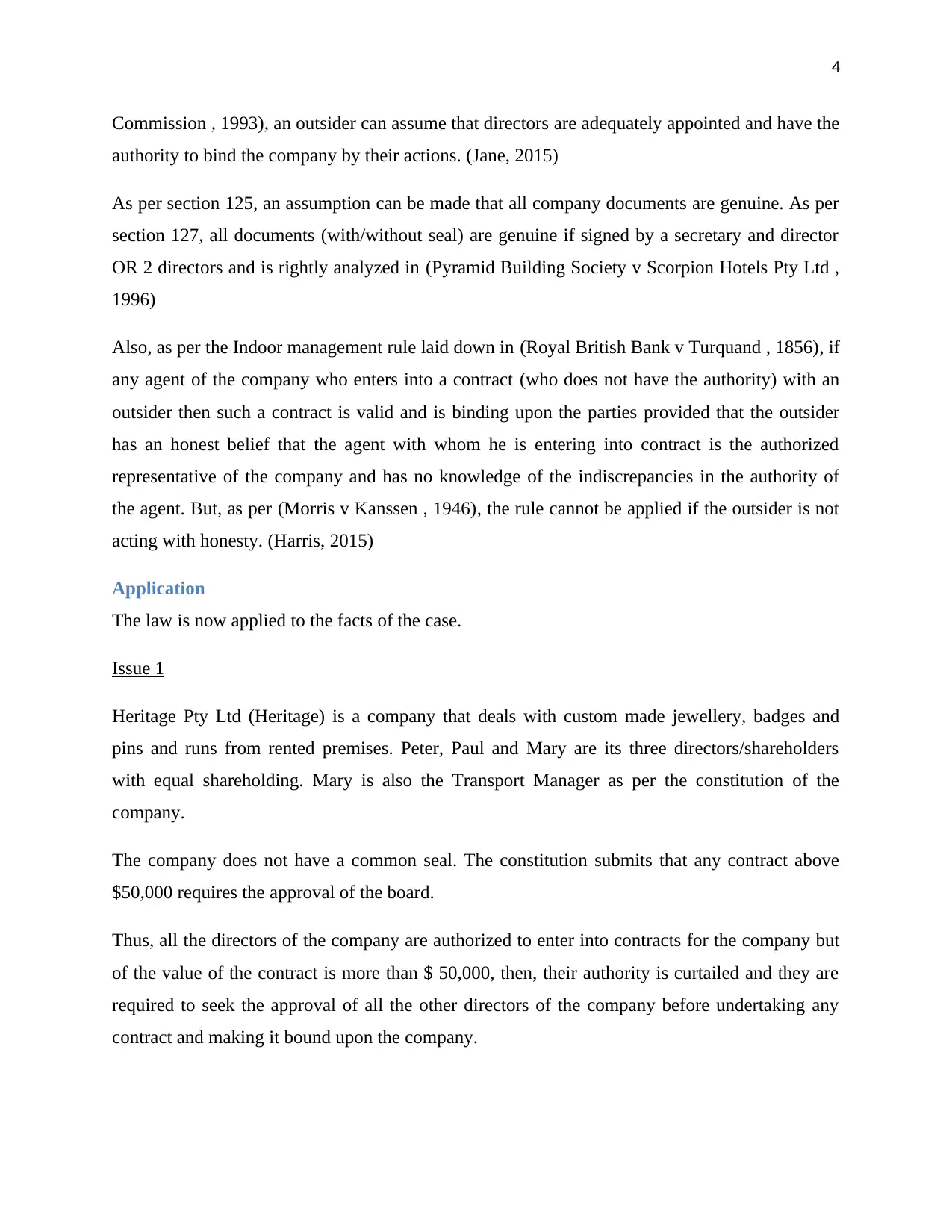
4
Commission , 1993), an outsider can assume that directors are adequately appointed and have the
authority to bind the company by their actions. (Jane, 2015)
As per section 125, an assumption can be made that all company documents are genuine. As per
section 127, all documents (with/without seal) are genuine if signed by a secretary and director
OR 2 directors and is rightly analyzed in (Pyramid Building Society v Scorpion Hotels Pty Ltd ,
1996)
Also, as per the Indoor management rule laid down in (Royal British Bank v Turquand , 1856), if
any agent of the company who enters into a contract (who does not have the authority) with an
outsider then such a contract is valid and is binding upon the parties provided that the outsider
has an honest belief that the agent with whom he is entering into contract is the authorized
representative of the company and has no knowledge of the indiscrepancies in the authority of
the agent. But, as per (Morris v Kanssen , 1946), the rule cannot be applied if the outsider is not
acting with honesty. (Harris, 2015)
Application
The law is now applied to the facts of the case.
Issue 1
Heritage Pty Ltd (Heritage) is a company that deals with custom made jewellery, badges and
pins and runs from rented premises. Peter, Paul and Mary are its three directors/shareholders
with equal shareholding. Mary is also the Transport Manager as per the constitution of the
company.
The company does not have a common seal. The constitution submits that any contract above
$50,000 requires the approval of the board.
Thus, all the directors of the company are authorized to enter into contracts for the company but
of the value of the contract is more than $ 50,000, then, their authority is curtailed and they are
required to seek the approval of all the other directors of the company before undertaking any
contract and making it bound upon the company.
Commission , 1993), an outsider can assume that directors are adequately appointed and have the
authority to bind the company by their actions. (Jane, 2015)
As per section 125, an assumption can be made that all company documents are genuine. As per
section 127, all documents (with/without seal) are genuine if signed by a secretary and director
OR 2 directors and is rightly analyzed in (Pyramid Building Society v Scorpion Hotels Pty Ltd ,
1996)
Also, as per the Indoor management rule laid down in (Royal British Bank v Turquand , 1856), if
any agent of the company who enters into a contract (who does not have the authority) with an
outsider then such a contract is valid and is binding upon the parties provided that the outsider
has an honest belief that the agent with whom he is entering into contract is the authorized
representative of the company and has no knowledge of the indiscrepancies in the authority of
the agent. But, as per (Morris v Kanssen , 1946), the rule cannot be applied if the outsider is not
acting with honesty. (Harris, 2015)
Application
The law is now applied to the facts of the case.
Issue 1
Heritage Pty Ltd (Heritage) is a company that deals with custom made jewellery, badges and
pins and runs from rented premises. Peter, Paul and Mary are its three directors/shareholders
with equal shareholding. Mary is also the Transport Manager as per the constitution of the
company.
The company does not have a common seal. The constitution submits that any contract above
$50,000 requires the approval of the board.
Thus, all the directors of the company are authorized to enter into contracts for the company but
of the value of the contract is more than $ 50,000, then, their authority is curtailed and they are
required to seek the approval of all the other directors of the company before undertaking any
contract and making it bound upon the company.
Paraphrase This Document
Need a fresh take? Get an instant paraphrase of this document with our AI Paraphraser
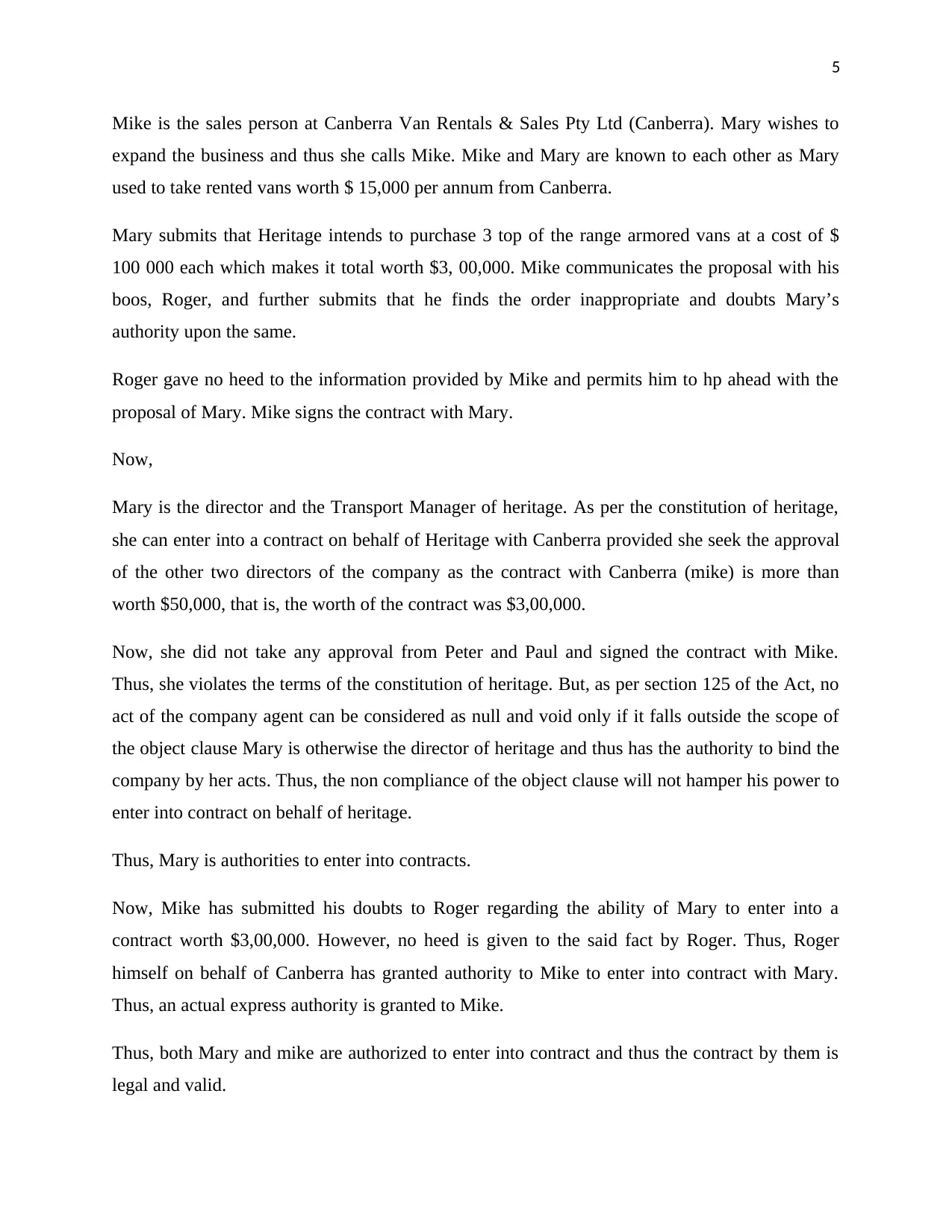
5
Mike is the sales person at Canberra Van Rentals & Sales Pty Ltd (Canberra). Mary wishes to
expand the business and thus she calls Mike. Mike and Mary are known to each other as Mary
used to take rented vans worth $ 15,000 per annum from Canberra.
Mary submits that Heritage intends to purchase 3 top of the range armored vans at a cost of $
100 000 each which makes it total worth $3, 00,000. Mike communicates the proposal with his
boos, Roger, and further submits that he finds the order inappropriate and doubts Mary’s
authority upon the same.
Roger gave no heed to the information provided by Mike and permits him to hp ahead with the
proposal of Mary. Mike signs the contract with Mary.
Now,
Mary is the director and the Transport Manager of heritage. As per the constitution of heritage,
she can enter into a contract on behalf of Heritage with Canberra provided she seek the approval
of the other two directors of the company as the contract with Canberra (mike) is more than
worth $50,000, that is, the worth of the contract was $3,00,000.
Now, she did not take any approval from Peter and Paul and signed the contract with Mike.
Thus, she violates the terms of the constitution of heritage. But, as per section 125 of the Act, no
act of the company agent can be considered as null and void only if it falls outside the scope of
the object clause Mary is otherwise the director of heritage and thus has the authority to bind the
company by her acts. Thus, the non compliance of the object clause will not hamper his power to
enter into contract on behalf of heritage.
Thus, Mary is authorities to enter into contracts.
Now, Mike has submitted his doubts to Roger regarding the ability of Mary to enter into a
contract worth $3,00,000. However, no heed is given to the said fact by Roger. Thus, Roger
himself on behalf of Canberra has granted authority to Mike to enter into contract with Mary.
Thus, an actual express authority is granted to Mike.
Thus, both Mary and mike are authorized to enter into contract and thus the contract by them is
legal and valid.
Mike is the sales person at Canberra Van Rentals & Sales Pty Ltd (Canberra). Mary wishes to
expand the business and thus she calls Mike. Mike and Mary are known to each other as Mary
used to take rented vans worth $ 15,000 per annum from Canberra.
Mary submits that Heritage intends to purchase 3 top of the range armored vans at a cost of $
100 000 each which makes it total worth $3, 00,000. Mike communicates the proposal with his
boos, Roger, and further submits that he finds the order inappropriate and doubts Mary’s
authority upon the same.
Roger gave no heed to the information provided by Mike and permits him to hp ahead with the
proposal of Mary. Mike signs the contract with Mary.
Now,
Mary is the director and the Transport Manager of heritage. As per the constitution of heritage,
she can enter into a contract on behalf of Heritage with Canberra provided she seek the approval
of the other two directors of the company as the contract with Canberra (mike) is more than
worth $50,000, that is, the worth of the contract was $3,00,000.
Now, she did not take any approval from Peter and Paul and signed the contract with Mike.
Thus, she violates the terms of the constitution of heritage. But, as per section 125 of the Act, no
act of the company agent can be considered as null and void only if it falls outside the scope of
the object clause Mary is otherwise the director of heritage and thus has the authority to bind the
company by her acts. Thus, the non compliance of the object clause will not hamper his power to
enter into contract on behalf of heritage.
Thus, Mary is authorities to enter into contracts.
Now, Mike has submitted his doubts to Roger regarding the ability of Mary to enter into a
contract worth $3,00,000. However, no heed is given to the said fact by Roger. Thus, Roger
himself on behalf of Canberra has granted authority to Mike to enter into contract with Mary.
Thus, an actual express authority is granted to Mike.
Thus, both Mary and mike are authorized to enter into contract and thus the contract by them is
legal and valid.
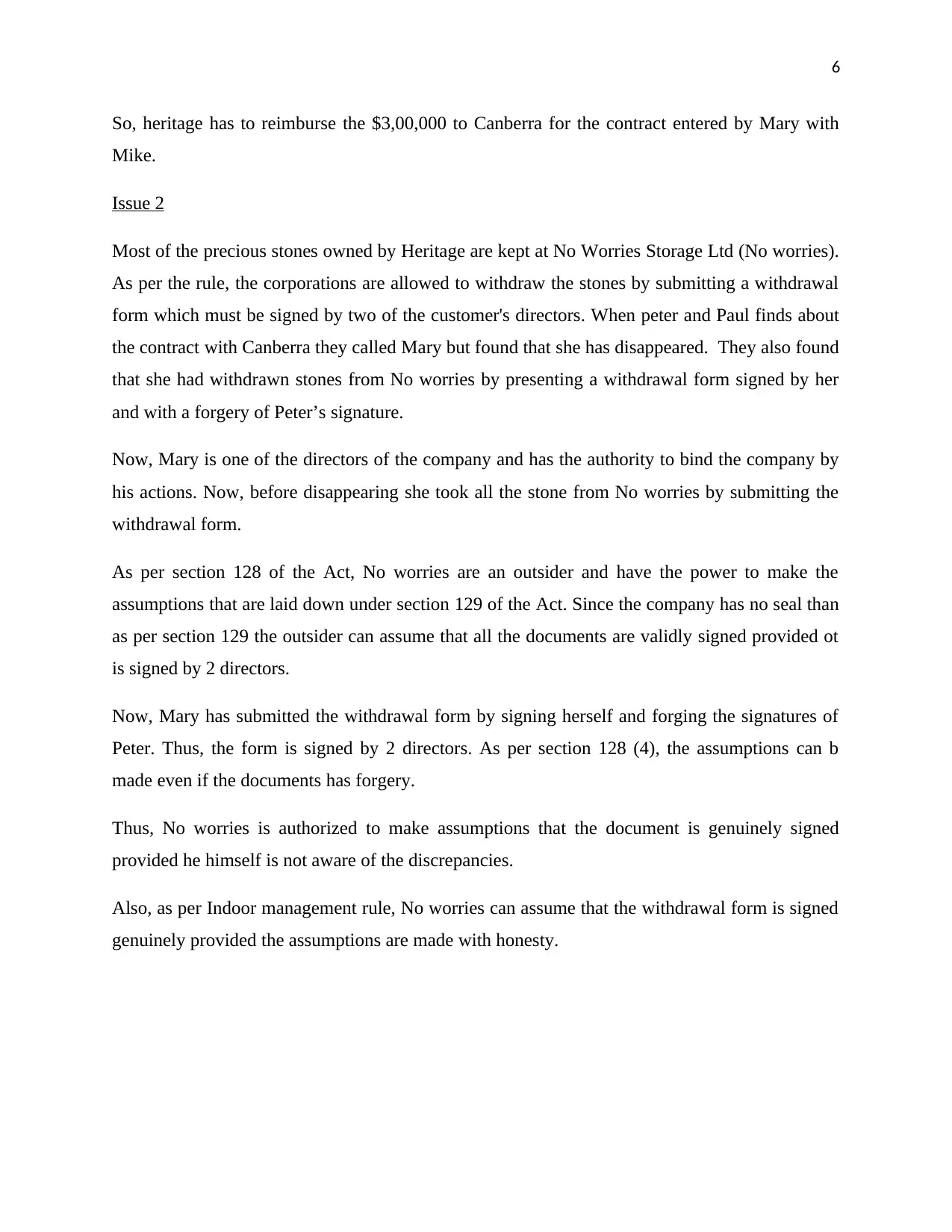
6
So, heritage has to reimburse the $3,00,000 to Canberra for the contract entered by Mary with
Mike.
Issue 2
Most of the precious stones owned by Heritage are kept at No Worries Storage Ltd (No worries).
As per the rule, the corporations are allowed to withdraw the stones by submitting a withdrawal
form which must be signed by two of the customer's directors. When peter and Paul finds about
the contract with Canberra they called Mary but found that she has disappeared. They also found
that she had withdrawn stones from No worries by presenting a withdrawal form signed by her
and with a forgery of Peter’s signature.
Now, Mary is one of the directors of the company and has the authority to bind the company by
his actions. Now, before disappearing she took all the stone from No worries by submitting the
withdrawal form.
As per section 128 of the Act, No worries are an outsider and have the power to make the
assumptions that are laid down under section 129 of the Act. Since the company has no seal than
as per section 129 the outsider can assume that all the documents are validly signed provided ot
is signed by 2 directors.
Now, Mary has submitted the withdrawal form by signing herself and forging the signatures of
Peter. Thus, the form is signed by 2 directors. As per section 128 (4), the assumptions can b
made even if the documents has forgery.
Thus, No worries is authorized to make assumptions that the document is genuinely signed
provided he himself is not aware of the discrepancies.
Also, as per Indoor management rule, No worries can assume that the withdrawal form is signed
genuinely provided the assumptions are made with honesty.
So, heritage has to reimburse the $3,00,000 to Canberra for the contract entered by Mary with
Mike.
Issue 2
Most of the precious stones owned by Heritage are kept at No Worries Storage Ltd (No worries).
As per the rule, the corporations are allowed to withdraw the stones by submitting a withdrawal
form which must be signed by two of the customer's directors. When peter and Paul finds about
the contract with Canberra they called Mary but found that she has disappeared. They also found
that she had withdrawn stones from No worries by presenting a withdrawal form signed by her
and with a forgery of Peter’s signature.
Now, Mary is one of the directors of the company and has the authority to bind the company by
his actions. Now, before disappearing she took all the stone from No worries by submitting the
withdrawal form.
As per section 128 of the Act, No worries are an outsider and have the power to make the
assumptions that are laid down under section 129 of the Act. Since the company has no seal than
as per section 129 the outsider can assume that all the documents are validly signed provided ot
is signed by 2 directors.
Now, Mary has submitted the withdrawal form by signing herself and forging the signatures of
Peter. Thus, the form is signed by 2 directors. As per section 128 (4), the assumptions can b
made even if the documents has forgery.
Thus, No worries is authorized to make assumptions that the document is genuinely signed
provided he himself is not aware of the discrepancies.
Also, as per Indoor management rule, No worries can assume that the withdrawal form is signed
genuinely provided the assumptions are made with honesty.
⊘ This is a preview!⊘
Do you want full access?
Subscribe today to unlock all pages.

Trusted by 1+ million students worldwide
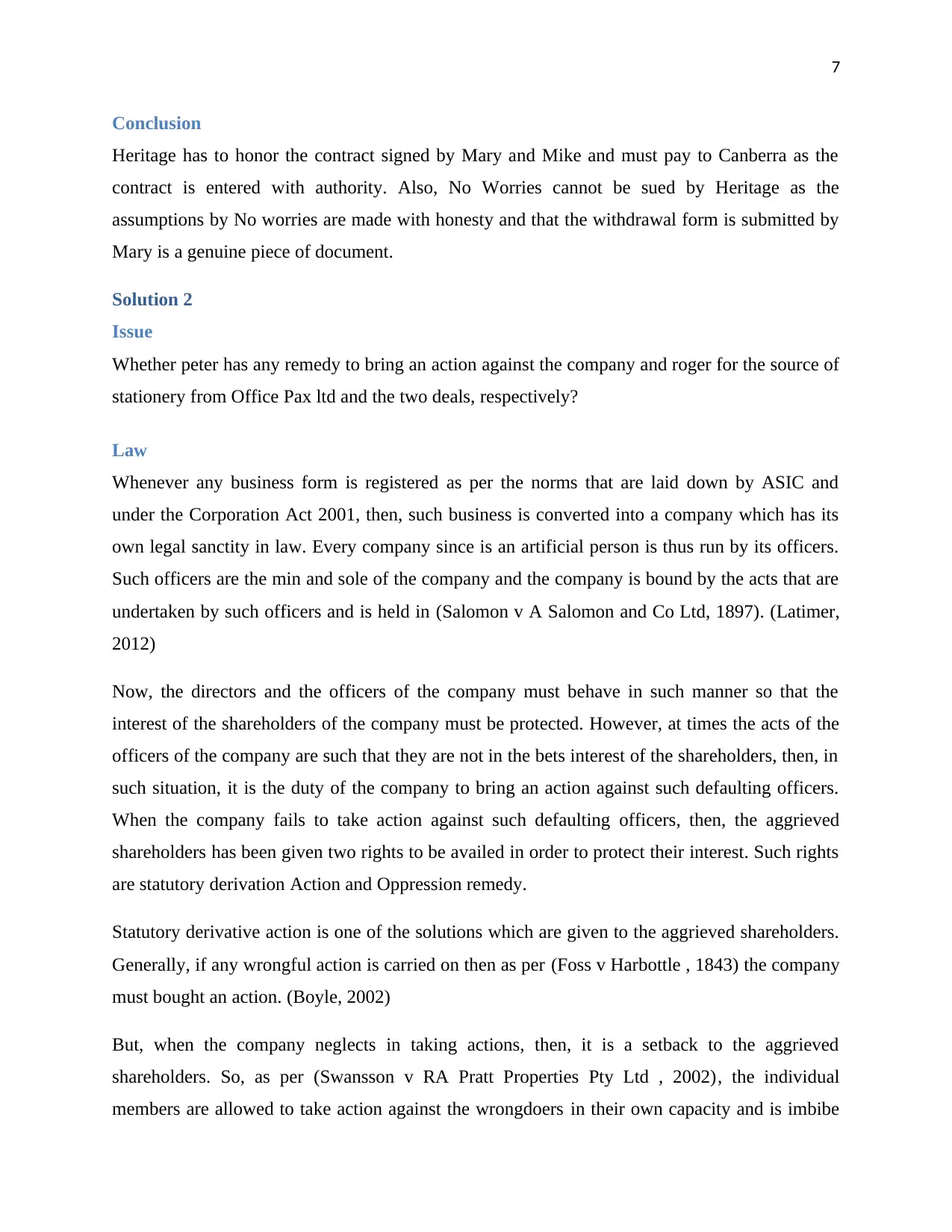
7
Conclusion
Heritage has to honor the contract signed by Mary and Mike and must pay to Canberra as the
contract is entered with authority. Also, No Worries cannot be sued by Heritage as the
assumptions by No worries are made with honesty and that the withdrawal form is submitted by
Mary is a genuine piece of document.
Solution 2
Issue
Whether peter has any remedy to bring an action against the company and roger for the source of
stationery from Office Pax ltd and the two deals, respectively?
Law
Whenever any business form is registered as per the norms that are laid down by ASIC and
under the Corporation Act 2001, then, such business is converted into a company which has its
own legal sanctity in law. Every company since is an artificial person is thus run by its officers.
Such officers are the min and sole of the company and the company is bound by the acts that are
undertaken by such officers and is held in (Salomon v A Salomon and Co Ltd, 1897). (Latimer,
2012)
Now, the directors and the officers of the company must behave in such manner so that the
interest of the shareholders of the company must be protected. However, at times the acts of the
officers of the company are such that they are not in the bets interest of the shareholders, then, in
such situation, it is the duty of the company to bring an action against such defaulting officers.
When the company fails to take action against such defaulting officers, then, the aggrieved
shareholders has been given two rights to be availed in order to protect their interest. Such rights
are statutory derivation Action and Oppression remedy.
Statutory derivative action is one of the solutions which are given to the aggrieved shareholders.
Generally, if any wrongful action is carried on then as per (Foss v Harbottle , 1843) the company
must bought an action. (Boyle, 2002)
But, when the company neglects in taking actions, then, it is a setback to the aggrieved
shareholders. So, as per (Swansson v RA Pratt Properties Pty Ltd , 2002), the individual
members are allowed to take action against the wrongdoers in their own capacity and is imbibe
Conclusion
Heritage has to honor the contract signed by Mary and Mike and must pay to Canberra as the
contract is entered with authority. Also, No Worries cannot be sued by Heritage as the
assumptions by No worries are made with honesty and that the withdrawal form is submitted by
Mary is a genuine piece of document.
Solution 2
Issue
Whether peter has any remedy to bring an action against the company and roger for the source of
stationery from Office Pax ltd and the two deals, respectively?
Law
Whenever any business form is registered as per the norms that are laid down by ASIC and
under the Corporation Act 2001, then, such business is converted into a company which has its
own legal sanctity in law. Every company since is an artificial person is thus run by its officers.
Such officers are the min and sole of the company and the company is bound by the acts that are
undertaken by such officers and is held in (Salomon v A Salomon and Co Ltd, 1897). (Latimer,
2012)
Now, the directors and the officers of the company must behave in such manner so that the
interest of the shareholders of the company must be protected. However, at times the acts of the
officers of the company are such that they are not in the bets interest of the shareholders, then, in
such situation, it is the duty of the company to bring an action against such defaulting officers.
When the company fails to take action against such defaulting officers, then, the aggrieved
shareholders has been given two rights to be availed in order to protect their interest. Such rights
are statutory derivation Action and Oppression remedy.
Statutory derivative action is one of the solutions which are given to the aggrieved shareholders.
Generally, if any wrongful action is carried on then as per (Foss v Harbottle , 1843) the company
must bought an action. (Boyle, 2002)
But, when the company neglects in taking actions, then, it is a setback to the aggrieved
shareholders. So, as per (Swansson v RA Pratt Properties Pty Ltd , 2002), the individual
members are allowed to take action against the wrongdoers in their own capacity and is imbibe
Paraphrase This Document
Need a fresh take? Get an instant paraphrase of this document with our AI Paraphraser
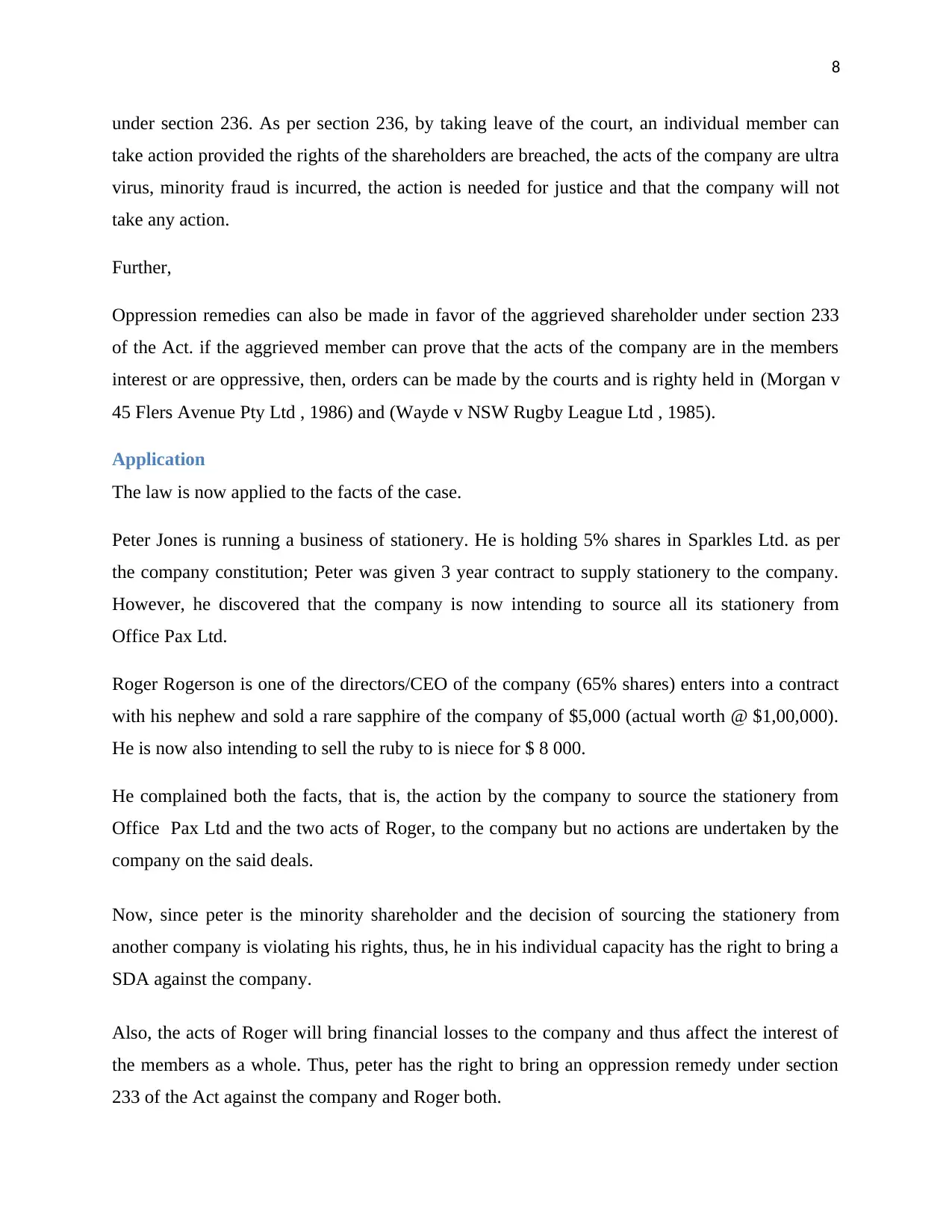
8
under section 236. As per section 236, by taking leave of the court, an individual member can
take action provided the rights of the shareholders are breached, the acts of the company are ultra
virus, minority fraud is incurred, the action is needed for justice and that the company will not
take any action.
Further,
Oppression remedies can also be made in favor of the aggrieved shareholder under section 233
of the Act. if the aggrieved member can prove that the acts of the company are in the members
interest or are oppressive, then, orders can be made by the courts and is righty held in (Morgan v
45 Flers Avenue Pty Ltd , 1986) and (Wayde v NSW Rugby League Ltd , 1985).
Application
The law is now applied to the facts of the case.
Peter Jones is running a business of stationery. He is holding 5% shares in Sparkles Ltd. as per
the company constitution; Peter was given 3 year contract to supply stationery to the company.
However, he discovered that the company is now intending to source all its stationery from
Office Pax Ltd.
Roger Rogerson is one of the directors/CEO of the company (65% shares) enters into a contract
with his nephew and sold a rare sapphire of the company of $5,000 (actual worth @ $1,00,000).
He is now also intending to sell the ruby to is niece for $ 8 000.
He complained both the facts, that is, the action by the company to source the stationery from
Office Pax Ltd and the two acts of Roger, to the company but no actions are undertaken by the
company on the said deals.
Now, since peter is the minority shareholder and the decision of sourcing the stationery from
another company is violating his rights, thus, he in his individual capacity has the right to bring a
SDA against the company.
Also, the acts of Roger will bring financial losses to the company and thus affect the interest of
the members as a whole. Thus, peter has the right to bring an oppression remedy under section
233 of the Act against the company and Roger both.
under section 236. As per section 236, by taking leave of the court, an individual member can
take action provided the rights of the shareholders are breached, the acts of the company are ultra
virus, minority fraud is incurred, the action is needed for justice and that the company will not
take any action.
Further,
Oppression remedies can also be made in favor of the aggrieved shareholder under section 233
of the Act. if the aggrieved member can prove that the acts of the company are in the members
interest or are oppressive, then, orders can be made by the courts and is righty held in (Morgan v
45 Flers Avenue Pty Ltd , 1986) and (Wayde v NSW Rugby League Ltd , 1985).
Application
The law is now applied to the facts of the case.
Peter Jones is running a business of stationery. He is holding 5% shares in Sparkles Ltd. as per
the company constitution; Peter was given 3 year contract to supply stationery to the company.
However, he discovered that the company is now intending to source all its stationery from
Office Pax Ltd.
Roger Rogerson is one of the directors/CEO of the company (65% shares) enters into a contract
with his nephew and sold a rare sapphire of the company of $5,000 (actual worth @ $1,00,000).
He is now also intending to sell the ruby to is niece for $ 8 000.
He complained both the facts, that is, the action by the company to source the stationery from
Office Pax Ltd and the two acts of Roger, to the company but no actions are undertaken by the
company on the said deals.
Now, since peter is the minority shareholder and the decision of sourcing the stationery from
another company is violating his rights, thus, he in his individual capacity has the right to bring a
SDA against the company.
Also, the acts of Roger will bring financial losses to the company and thus affect the interest of
the members as a whole. Thus, peter has the right to bring an oppression remedy under section
233 of the Act against the company and Roger both.
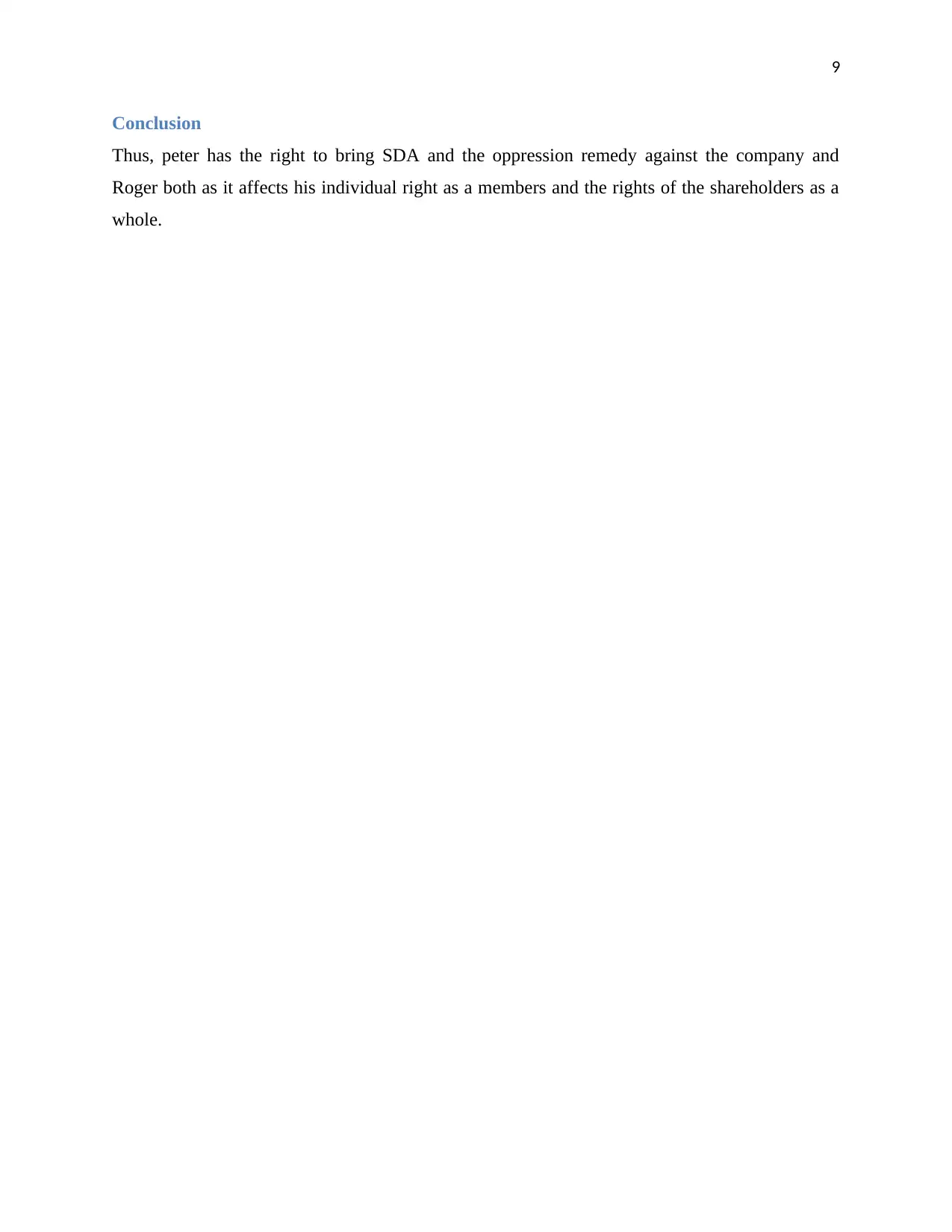
9
Conclusion
Thus, peter has the right to bring SDA and the oppression remedy against the company and
Roger both as it affects his individual right as a members and the rights of the shareholders as a
whole.
Conclusion
Thus, peter has the right to bring SDA and the oppression remedy against the company and
Roger both as it affects his individual right as a members and the rights of the shareholders as a
whole.
⊘ This is a preview!⊘
Do you want full access?
Subscribe today to unlock all pages.

Trusted by 1+ million students worldwide
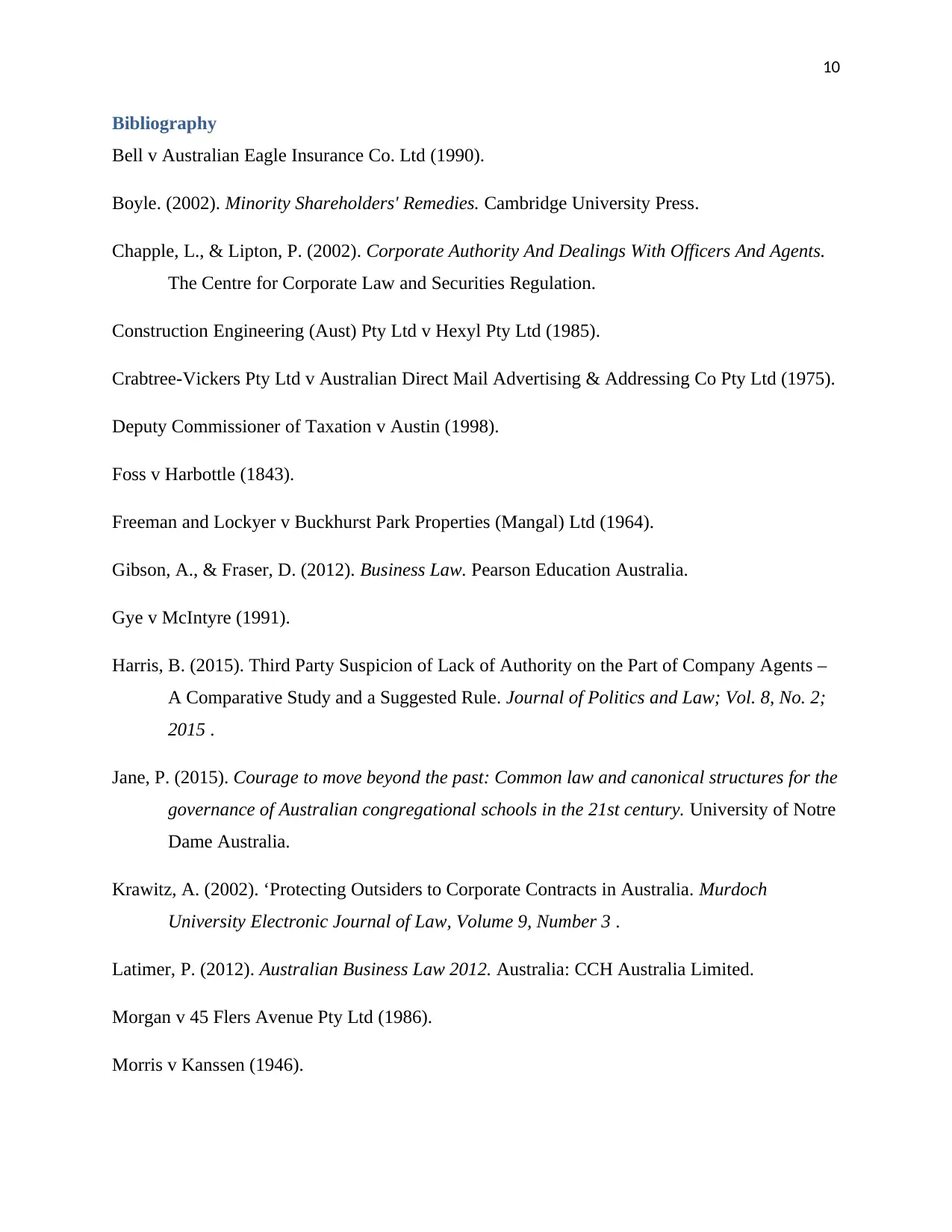
10
Bibliography
Bell v Australian Eagle Insurance Co. Ltd (1990).
Boyle. (2002). Minority Shareholders' Remedies. Cambridge University Press.
Chapple, L., & Lipton, P. (2002). Corporate Authority And Dealings With Officers And Agents.
The Centre for Corporate Law and Securities Regulation.
Construction Engineering (Aust) Pty Ltd v Hexyl Pty Ltd (1985).
Crabtree-Vickers Pty Ltd v Australian Direct Mail Advertising & Addressing Co Pty Ltd (1975).
Deputy Commissioner of Taxation v Austin (1998).
Foss v Harbottle (1843).
Freeman and Lockyer v Buckhurst Park Properties (Mangal) Ltd (1964).
Gibson, A., & Fraser, D. (2012). Business Law. Pearson Education Australia.
Gye v McIntyre (1991).
Harris, B. (2015). Third Party Suspicion of Lack of Authority on the Part of Company Agents –
A Comparative Study and a Suggested Rule. Journal of Politics and Law; Vol. 8, No. 2;
2015 .
Jane, P. (2015). Courage to move beyond the past: Common law and canonical structures for the
governance of Australian congregational schools in the 21st century. University of Notre
Dame Australia.
Krawitz, A. (2002). ‘Protecting Outsiders to Corporate Contracts in Australia. Murdoch
University Electronic Journal of Law, Volume 9, Number 3 .
Latimer, P. (2012). Australian Business Law 2012. Australia: CCH Australia Limited.
Morgan v 45 Flers Avenue Pty Ltd (1986).
Morris v Kanssen (1946).
Bibliography
Bell v Australian Eagle Insurance Co. Ltd (1990).
Boyle. (2002). Minority Shareholders' Remedies. Cambridge University Press.
Chapple, L., & Lipton, P. (2002). Corporate Authority And Dealings With Officers And Agents.
The Centre for Corporate Law and Securities Regulation.
Construction Engineering (Aust) Pty Ltd v Hexyl Pty Ltd (1985).
Crabtree-Vickers Pty Ltd v Australian Direct Mail Advertising & Addressing Co Pty Ltd (1975).
Deputy Commissioner of Taxation v Austin (1998).
Foss v Harbottle (1843).
Freeman and Lockyer v Buckhurst Park Properties (Mangal) Ltd (1964).
Gibson, A., & Fraser, D. (2012). Business Law. Pearson Education Australia.
Gye v McIntyre (1991).
Harris, B. (2015). Third Party Suspicion of Lack of Authority on the Part of Company Agents –
A Comparative Study and a Suggested Rule. Journal of Politics and Law; Vol. 8, No. 2;
2015 .
Jane, P. (2015). Courage to move beyond the past: Common law and canonical structures for the
governance of Australian congregational schools in the 21st century. University of Notre
Dame Australia.
Krawitz, A. (2002). ‘Protecting Outsiders to Corporate Contracts in Australia. Murdoch
University Electronic Journal of Law, Volume 9, Number 3 .
Latimer, P. (2012). Australian Business Law 2012. Australia: CCH Australia Limited.
Morgan v 45 Flers Avenue Pty Ltd (1986).
Morris v Kanssen (1946).
Paraphrase This Document
Need a fresh take? Get an instant paraphrase of this document with our AI Paraphraser
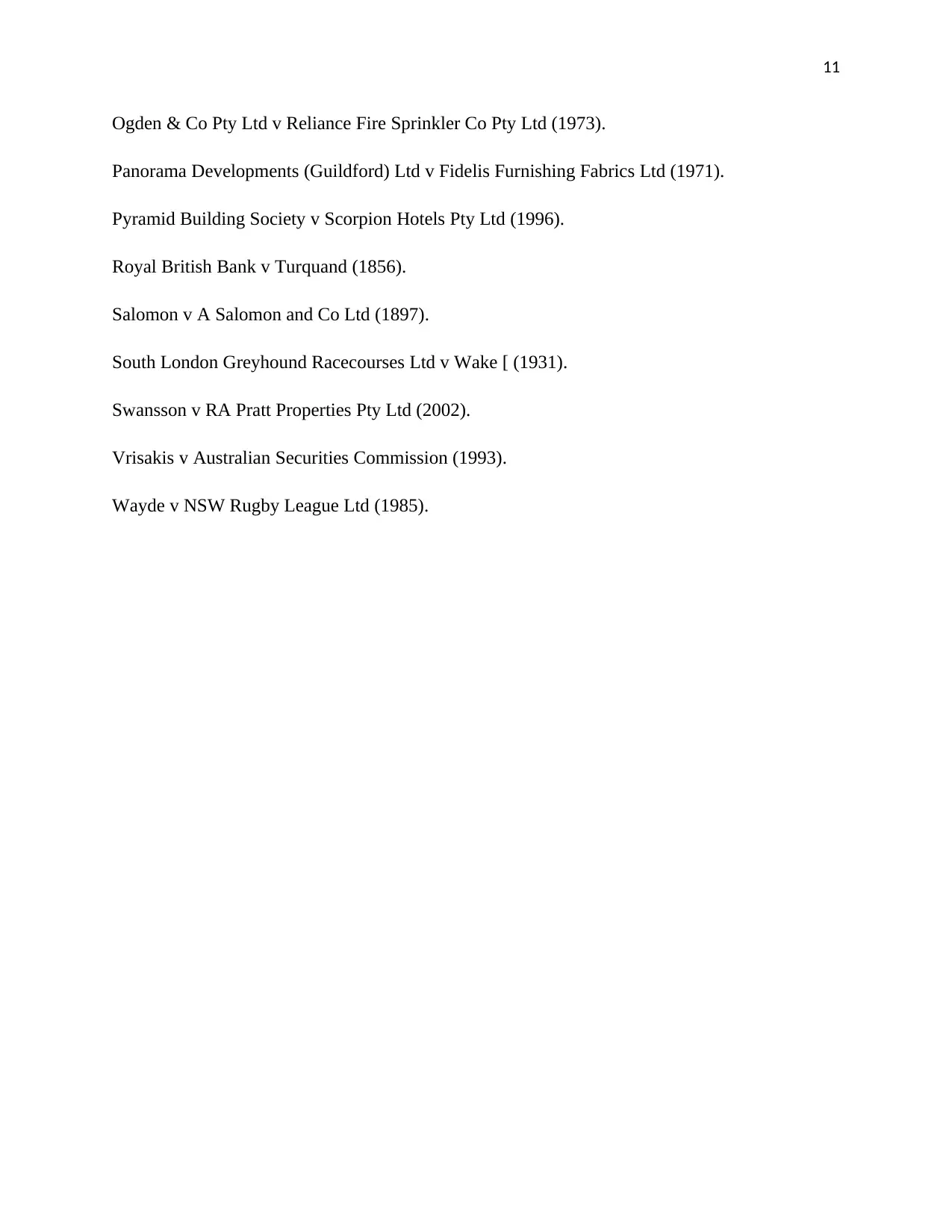
11
Ogden & Co Pty Ltd v Reliance Fire Sprinkler Co Pty Ltd (1973).
Panorama Developments (Guildford) Ltd v Fidelis Furnishing Fabrics Ltd (1971).
Pyramid Building Society v Scorpion Hotels Pty Ltd (1996).
Royal British Bank v Turquand (1856).
Salomon v A Salomon and Co Ltd (1897).
South London Greyhound Racecourses Ltd v Wake [ (1931).
Swansson v RA Pratt Properties Pty Ltd (2002).
Vrisakis v Australian Securities Commission (1993).
Wayde v NSW Rugby League Ltd (1985).
Ogden & Co Pty Ltd v Reliance Fire Sprinkler Co Pty Ltd (1973).
Panorama Developments (Guildford) Ltd v Fidelis Furnishing Fabrics Ltd (1971).
Pyramid Building Society v Scorpion Hotels Pty Ltd (1996).
Royal British Bank v Turquand (1856).
Salomon v A Salomon and Co Ltd (1897).
South London Greyhound Racecourses Ltd v Wake [ (1931).
Swansson v RA Pratt Properties Pty Ltd (2002).
Vrisakis v Australian Securities Commission (1993).
Wayde v NSW Rugby League Ltd (1985).
1 out of 11
Related Documents
Your All-in-One AI-Powered Toolkit for Academic Success.
+13062052269
info@desklib.com
Available 24*7 on WhatsApp / Email
![[object Object]](/_next/static/media/star-bottom.7253800d.svg)
Unlock your academic potential
Copyright © 2020–2026 A2Z Services. All Rights Reserved. Developed and managed by ZUCOL.





